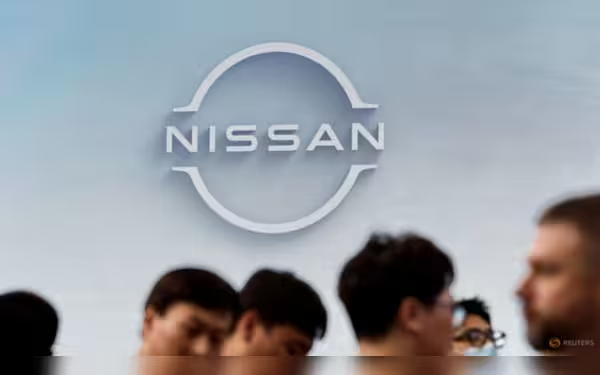Saturday, November 16, 2024 07:43 PM
Nissan Job Cuts and Profit Outlook Revision
- Nissan to cut 9,000 jobs amid profit forecast drop.
- Operating profit plummets by 85% in Q2.
- Sales decline significantly in key markets.
 Image Credits: channelnewsasia
Image Credits: channelnewsasiaNissan announces 9,000 job cuts and a drastic profit outlook revision amid declining sales in key markets.
TOKYO: In a significant move, Nissan has announced plans to cut 9,000 jobs and reduce its global production capacity by 20%. This decision comes as the company faces tough challenges in major markets like China and the United States. The automaker has also revised its annual profit outlook sharply downward, now forecasting an operating profit of only 150 billion yen (approximately US$975 million). This marks a staggering 70% reduction from previous estimates, following an earlier 17% cut earlier this year.
During the second quarter, which spans from July to September, Nissan's operating profit plummeted by 85%, falling to 32.9 billion yen. This figure is significantly lower than the consensus estimate of 66.8 billion yen, indicating a troubling trend for the company.
CEO Makoto Uchida addressed these challenges, stating, "Nissan will restructure its business to become leaner and more resilient, while also reorganizing management to respond quickly and flexibly to changes in the business environment." He emphasized that these measures do not mean the company is shrinking, but rather adapting to the current market conditions.
Nissan's global sales have also taken a hit, dropping by 3.8% to 1.59 million vehicles in the first half of the financial year. A significant factor in this decline is a 14.3% decrease in sales in China, where Nissan is striving to regain its footing against local competitors. In the United States, sales fell nearly 3% to about 449,000 vehicles. Together, these two markets represent nearly half of Nissan's total global sales.
Uchida noted that the company was caught off guard by the rapid growth in demand for hybrid vehicles, stating that Nissan did not have the necessary hybrid and plug-in hybrid models to meet market needs. This oversight has contributed to the company's struggles in these key markets.
Nissan is not alone in facing difficulties in China. Other foreign automakers are also feeling the pressure from increasing competition, particularly in the electric vehicle sector. For instance, Honda Motor recently reported a surprising 15% drop in its second-quarter operating profit, primarily due to a significant sales decline in China.
Despite these challenges, shares in Nissan saw a slight increase of 2.2% prior to the earnings announcement, contrasting with a 0.25% drop in the broader market. This indicates that investors may still hold some confidence in the company's ability to navigate these turbulent times.
Nissan's decision to cut jobs and production capacity reflects the harsh realities of the automotive industry today. As competition intensifies, especially in the electric vehicle market, it is crucial for companies like Nissan to adapt quickly and effectively. The future of the automaker will depend on its ability to innovate and meet the changing demands of consumers, particularly in key markets like China and the United States.













